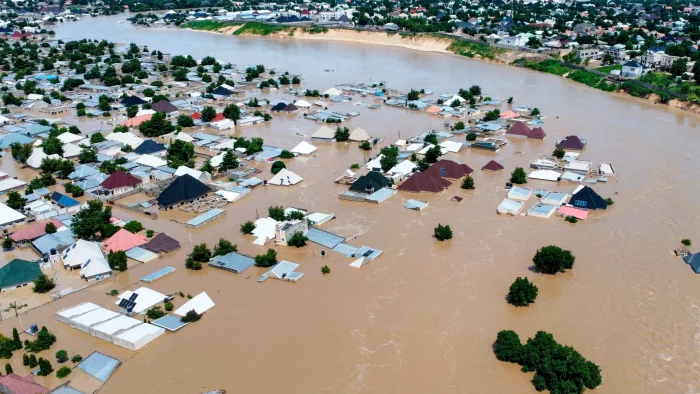Floods have become a recurring disaster in many parts of Nigeria, and Maiduguri recently faced one of the worst flood incidents in 30 years. Approximately 40% of the city was submerged. The crisis was said to have been caused by the rupture of the Alau dam, 20 km south of Maiduguri. The flood submerged homes, claimed lives, destroyed thousands of hectares of farmland, and displaced entire communities. For farmers, this disaster meant the loss of a year’s harvest and a significant threat to their livelihood and food security. Countless families lost everything, from properties to personal belongings leaving them without shelter, healthcare, education, clean water, and food. Businesses in the area were also not spared, facing interruptions that would take several months or years to recover from.
It is worthy of note that many philanthropists swiftly rose to the occasion by making generous donations in billions of Naira and in-kind to alleviate the suffering of the victims. This is highly commendable.
Nevertheless, the flat landscape of Maiduguri, coupled with its closeness to the Komadougou Yobe River, makes the city highly susceptible to flooding, a situation that is common in several states in Nigeria. While dams and other infrastructures offer some level of protection, inadequate maintenance and ineffective disaster response systems frequently fail to prevent flood damage, leaving the most susceptible communities at greatest risk.
Although natural disasters such as floods may not always be preventable, the Maiduguri flood emphasizes the need for a comprehensive national disaster management strategy that goes beyond mere donations and physical infrastructure. It underscores the need for enhanced collaboration among stakeholders and the strengthening of financial resilience through insurance, which is crucial in disaster recovery efforts.
The recurrent flooding across Nigeria during rainy seasons (June to September) requires a shift toward more proactive solutions. Implementing a robust risk management strategy is crucial with insurance being a key component. It is essential to create a comprehensive flood insurance program backed up by public policy and involving all stakeholders to help affected communities recover from natural disasters more quickly and effectively.
Flooding in the rainy season is a natural disaster, but its effects can be mitigated if the government spearheads a partnership with the insurance industry. A key strategy is the establishment of a national insurance program. This partnership could lead to the creation of public-private insurance schemes or a dedicated flood insurance pool, effectively distributing the risk and aiding swift recovery efforts.
Partnership with the Government while beneficial for the public will also make the insurance of flood risks in flood-prone areas appealing to insurance companies. This will enhance the overall risk profile through risk improvement initiatives, provide access to larger markets, and offer financial support or incentives during major disasters. Without this coordinated and collective approach, supported by public policy, Nigeria will continue to suffer preventable losses year after year.
How Insurance Could Have Helped Mitigate the Losses
Insurance plays a crucial role in reducing the financial burden that comes with disasters like floods. Below are some of the insurance products currently in the market.
- Property Insurance: This covers the cost of repairing or rebuilding homes and businesses damaged by natural disasters. For homeowners and business owners in Maiduguri, property insurance would have provided the funds needed to rebuild their properties and reopen their businesses after the flood.
- Business Interruption Insurance Many businesses in Maiduguri had to shut down due to the damage caused by the floods. Business interruption insurance would have helped these businesses cover lost income during the recovery period, ensuring that they could continue paying their employees and operating as soon as possible.
- Agricultural Insurance The flooding in Maiduguri destroyed a large portion of farmland, leaving many farmers without any income. Agriculture insurance protects farmers from losses due to extreme weather conditions. With this coverage, farmers would have been compensated for the crops lost, allowing them to recover faster and continue farming.
- Life and Health Insurance The floods unfortunately led to the loss of lives. Life insurance would have provided financial support to the families of the deceased, helping them cope with the economic challenges after losing a breadwinner. Additionally, health insurance could have covered medical expenses for those injured during the flood, as well as potential health issues arising from water-borne disease outbreaks.
- Motor Insurance: Individuals and businesses with comprehensive cover and a flood extension would be able to repair or replace damaged vehicles quickly, minimizing downtime and operational losses.
The benefits of government partnerships for all stakeholders cannot be overstated. Such collaborations have the potential to result in the development of innovative stand-alone insurance products specifically designed for natural disasters, beyond the typical policies that usually include these events as additional endorsements.
Conclusion:
The September 10, 2024, flood in Maiduguri is undoubtedly a reminder of the growing risks posed by natural disasters in Nigeria and the need for proactive disaster management strategies. While donations and relief efforts are commendable, they fall short of fully restoring communities and aiding individuals in rebuilding their lives. Consequently, insurance should be pivotal in securing financial resilience and safeguarding the most vulnerable populations.
The time has come for a national dialogue on implementing a comprehensive national flood insurance program that requires contributions from the government, private insurers, and citizens alike. Through strong partnerships, robust risk management, and leveraging insurance solutions, Nigeria can mitigate the impact of future disasters and minimize the effect on individuals, businesses, communities, and the economy.
Call to Action
The time for action is now. We must advocate for enhanced disaster preparedness and insurance solutions at local, state, and federal government levels so as to safeguard our communities and loved ones from the effects of flooding. For more information on flood insurance, feel free to leave a message in my comment section. Together, we can build a more resilient future.



Interesting read..
Thnak you, Flora. I appreciate you. Look out for the next episode. It promises to be educative.
This is a timely eye opener. Weldone Madam
Thank you, Sunday. I appreciate. Look out for my next episode. It promises to be educative.
This information was insightful.
I look forward to seeing more initiatives aimed at building resilience in Nigeria through insurance.
Folashade, Thank you so much for reading. Glad you found it insightful. I’m encouraged. Expect another insightful episode before weekend.